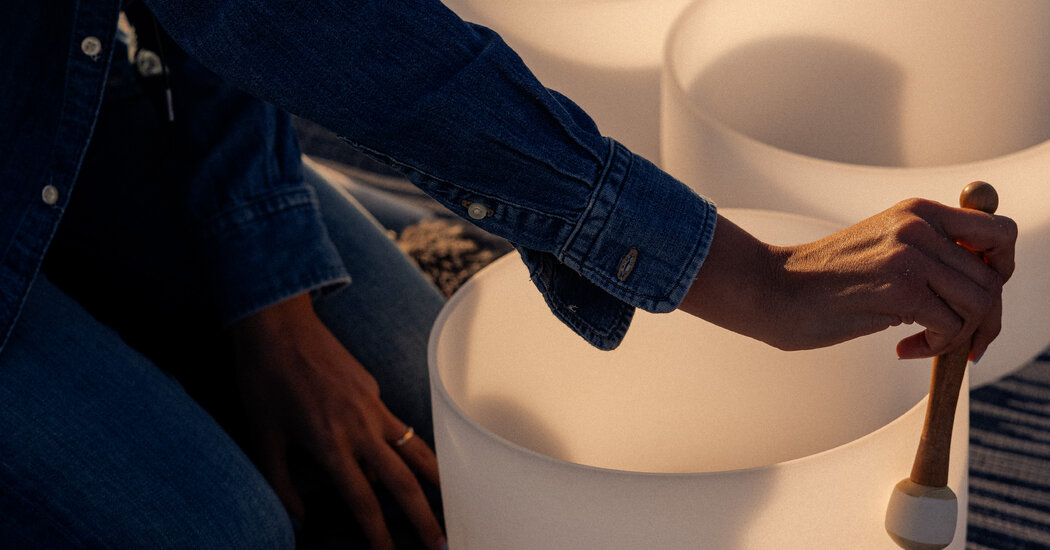As the sun set over the Pacific Ocean, the beach cool against my back, a voice invited me to scan my body for feelings of powerlessness. “Then breathe in that area to help it release,” said Sara Sofia Bousiali, the leader of the evening’s sound bath.
Along with 21 other participants lying on the sand in Santa Monica this April, I listened as Ms. Bousiali played crystal singing bowls and chimes and guided us in an hourlong meditation. At the sound baths I’ve attended, the bell-like sounds seemed to fill my body and melt away racing thoughts. I lost track of time.
Therapeutic sound “baths” have been around for a few decades, said Jamie Bechtold, the co-founder and owner of a sound bath studio in Los Angeles. But she has seen their popularity grow in the last five years, she said, and lately they’ve spread beyond wellness hot spots like Southern California. They’ve popped up across the U.S., offered in a yoga studio in Cleveland and a barn outside of Raleigh, at corporate events and even onstage at Coachella.
What is a sound bath?
During a sound bath, participants are immersed in tones and vibrations from instruments like gongs, chimes, bells and singing bowls. Some instructors also add guided meditations or wellness rituals like Reiki energy healing.
The name stems from the idea of waves of sound washing over people, said Tamara Goldsby, a research psychologist at the University of California San Diego who has studied sound baths. While sound baths draw inspiration and use instruments from various spiritual traditions, they’re part of modern wellness culture.
Sessions promise relaxation, and some people may even fall asleep. (At two sound baths I went to, leaders told participants to prepare for possible snoring.) Some participants have said that sound baths surfaced strong feelings — as well as powerful bodily sensations.
“I felt a lot of intensity,” said Ann-Marie Lindblad, a filmmaker and musician, after a gong sound bath in northeast Los Angeles earlier this month. The experience could have been overwhelming, she added, “if I was in a bad place in my mind.”
People who are sensitive to sound should be careful about which sound baths they attend, Dr. Goldsby said, and look for more experienced practitioners. The sounds from crystal bowls can be uncomfortable when played too loudly, she said.
Sound and our health
Sound can affect both our physical and mental health, said Nina Kraus, a neurobiologist at Northwestern University and the author of “Of Sound Mind: How Our Brain Constructs a Meaningful Sonic World.”
“It’s underrecognized because it’s invisible.” Dr. Kraus added. For example, few people realize on how much background noise — an air-conditioner or a leaf blower — can affect how we feel, she said.
Dr. Kraus said a number of systems within the body play a role in how we process sound, affecting how we think, how we feel and how we move. Sound is also deeply linked to memory, she said, so it may affect you emotionally and psychologically.
The practice of sound healing, including sound baths, has not been widely studied. But limited research does suggest it may provide some benefits, at least in the moment.
In an observational study of 62 people, participants scored lower on a scale designed to measure feelings of anxiety and depressed mood after one singing bowl meditation than they did before the session. Dr. Goldsby, who was the lead author of that study, added that some participants reported less tension after the session, and that effect was greater for those who hadn’t tried sound meditation before.
One small randomized trial of 74 undergraduate students found that those who did a 30-minute meditation with didgeridoo music felt more relief from anxiety and acute stress than those who did a silent meditation. Another suggested sound-based treatment could be an useful relaxation tool for people who occasionally feel anxious.
Should you try a sound bath?
Some practitioners make broad health promises about sound baths, claiming they can aid depression, lower blood pressure and, more fancifully, even repair DNA.
These benefits can’t be proven without scientific trials, said Dr. David Silbersweig, a professor of psychiatry at Harvard Medical School. And it’s difficult to know whether the effects people do report come from the sounds themselves or the relaxing environment in which they’re played, he added.
Some instructors are careful not to oversell their work. Ms. Bechtold, a sound bath teacher and gong player of 20 years, said she saw sound baths as a part of an overall wellness routine. They can give participants time and space to process emotions, Ms. Bechtold said, “and at the same time learn to more deeply relax the body.”
Perhaps that’s one key to their appeal.
Alejandra Davila, 29, who attended the beach sound bath in Santa Monica, said she was drawn in by posts on Instagram.
“I kept wanting to try yoga,” Ms. Davila said, “and this just kind of seemed more Zen and more relaxing.”







